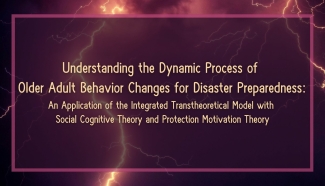
Chenyi Ma and Dennis Culhane's paper explores how older adults modify their disaster preparedness behavior using concepts from the Transtheoretical Model, Social Cognitive Theory, and Protection Motivation Theory.
Abstract: Integrating the Transtheoretical Model with Social Cognitive Theory and Protection Motivation Theory, we propose a new model to study the progress of behavior changes towards disaster preparedness along three developmental stages: from “not prepared” (NP), to “intention to prepare” (IP), to “already prepared” (AP). Using the 2021 National Household Survey data (FEMA, N = 6,180), we tested this model by employing a series of nested weighted generalized ordered logistic regressions. We found that, although Hispanics have a larger prevalence of IP than their non-Hispanic white counterparts, they are less likely to move to the AP stage. The observed ethnic disparity is largely due to the disparities in actual behavioral capabilities in essential knowledge and access to resources between the two groups. Personal disaster experience, social/observational learning, self-efficacy, and risk perception each facilitate behavior changes from the NP to IP or AP stage (i.e., departure from NP stage) and from NP or IP stage to AP stage (i.e., arrival at AP stage). Although income does not necessarily influence one’s decision to depart from the NP stage, it determines one’s arrival at the AP stage. Increasing one’s income further boosts the realization of AP for people with high-risk perceptions. However, for people with moderate or low levels of risk perceptions, increased income did not lead to arrival at the AP stage. Additional research is needed to more fully apply this process oriented approach with new measurement introduced in this paper to study the behavior changes among subpopulations in exposure to specific hazards.
Ma Chenyi. Culhane, Dennis. Bachmann, Sara S. 2024. "Understanding the Dynamic Process of Older Adult Behavior Changes for Disaster Preparedness: An Application of the Integrated Transtheoretical Model with Social Cognitive Theory and Protection Motivation Theory." University of Pennsylvania Population Center Working Paper (PSC/PARC).